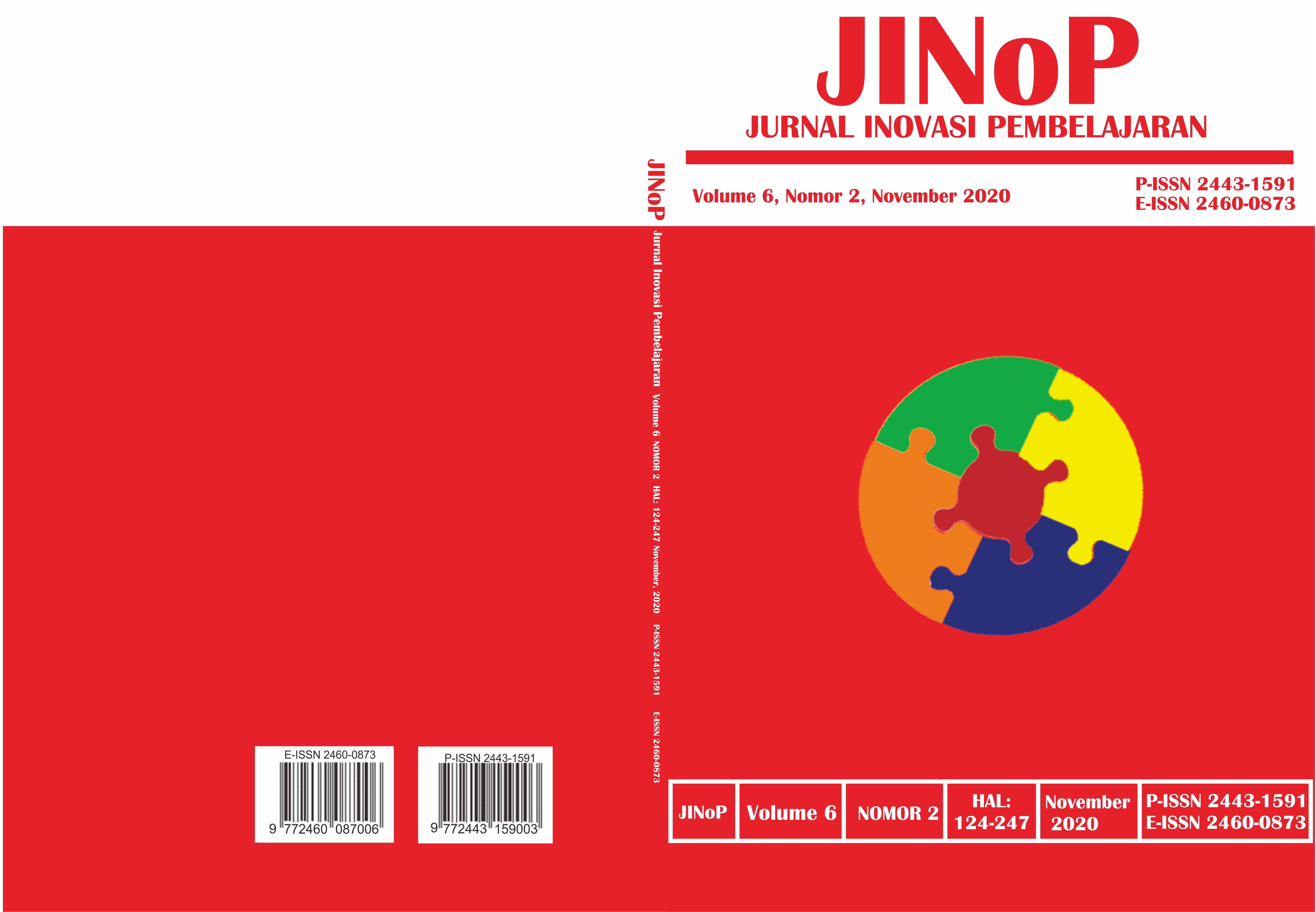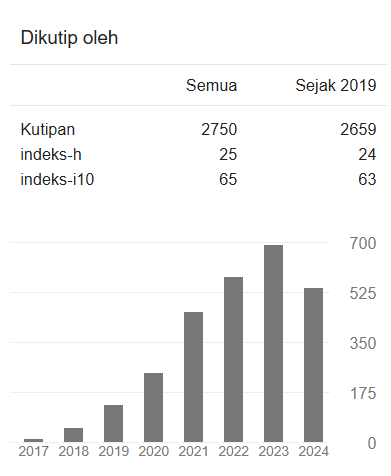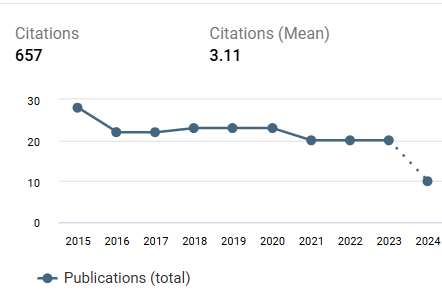Aplikasi model inkuiri terbimbing berbantuan LKPD untuk meningkatkan keterampilan proses sains pada materi kalor
DOI:
https://doi.org/10.22219/jinop.v6i2.11490Keywords:
Inkuiri Terbimbing, LKPD, Keterampilan Proses SainsAbstract
Penulisan ini dilatar belakangi oleh pola pembelajaran yang ditekankan saat ini selain menuntut pembelajaran yang mengedepankan kemampuan berpikir kritis juga pembelajaran harus menggunakan pendekatan saintifik. Kebanyakan peserta didik menganggap bahwa materi fisika terutama subkonsep kalor adalah materi abstrak. Untuk itu, perlu ada aplikasi dalam pembelajaran yaitu dengan mengaplikasikan model inkuiri terbimbing berbantuan LKPD agar peserta didik dapat meningkatkan keterampilan proses sainsnya. Tujuan penelitian ini yaitu mendeskripsikan aplikasi model inkuiri terbimbing berbantuan LKPD untuk meningkatkan keterampilan proses sains pada materi kalor. Metode yang digunakan dalam penulisan ini yaitu dengan studi kepustakaan dengan mengkaji beberapa literatur untuk dianalisis dan dibuat kesimpulan. Hasil penulisan menunjukkan bahwa model inkuiri terbimbing berbantuan LKPD untuk peserta didik dapat menjadi solusi dari permasalahan yang ditemui dalam meningkatkan keterampilan proses sains peserta didik di kelas. Model inkuiri terbimbing berbantuan LKPD diaplikasikan kepada peserta didik di Sekolah Menengah Atas dengan beberapa langkah antara lain; peserta didik diberikan masalah untuk dipecahkan, masalah diberikan dalam bentuk LKPD, selanjutnya melakukan proses analisis dan diskusi untuk menemukan solusi dari masalah yang ditemukan, setelah itu peserta didik melakukan presentasi kepada kelompok lain dengan LKPD yang sudah di isi selama proses pembelajaran berlangsug. Dengan demikian, pembelajaran dengan model inkuiri terbimbing dapat meningkatkan keterampilan proses sains peserta didik di kelas
Kata Kunci: Inkuiri terbimbing, LKPD, Keterampilan proses sains
ABSTRACT
This article was based on the learning patterns that are emphasized at present, apart from demanding learning that prioritizes critical thinking skills, learning must also use a scientific approach. Most students consider that Physics, especially the sub-concept of heat, is an abstract material. For this reason, there was a need for an application in learning, namely by applying a guided inquiry model assisted by LKPD so that students can improve their science process skills. The purpose of this research was to describe the application of the guided inquiry model assisted by LKPD to improve science process skills in heat material. The method used in this writing is literature study by reviewing some of the literature to be analyzed and made conclusions. The results of the writing show that the guided inquiry model assisted by LKPD for students can be a solution to the problems encountered in improving the science process skills of students in the classroom. The LKPD-assisted guided inquiry model was applied to students in Senior High Schools with several steps, among others; students were given problems to solve, problems were given in the form of LKPD, then carried out a process of analysis and discussion to find solutions to the problems found, after that students made presentations to other groups with LKPD that have been filled during the learning process. Thus, learning with a guided inquiry model can improve the science process skills of students in the classroom
Keywords: Guided inquiry, LKPD, Science process skills
Downloads
References
Abidin, Y. (2014). Desain Sistem Pembelajaran dalam Konteks Kurikulum 2013. Bandung: PT Refika aditama.
Alhudaya, M. T. (2018). Pengaruh Inkuiri Terbimbing terhadap Keterampilan Proses Sains dan Pemahaman Konsep Optik Siswa Kelas VIII. Jurnal Pendidikan: Teori, Penelitian, dan Pengembangan Volume: 3 Nomor: 11
Anam, K. (2017). Pembelajaran Berbasis Inkuiri, Metode dan Aplikasi. Yogyakarta: Pustaka Pelajar.
Asniati, M dan Tabrani G. (2017). “Analisis Kompetensi Guru Kimia dalam Mengimplementasikan Model Pembelajaran Berbasis Kurikulum 2013 di SMK SMAK Makassar”. Chemistry Education Review (CER), (1), 01-12.
Chusni, M M. (2016). Studi komparatif pendekatan verifikasi dan pendekatan inkuiri terbimbing terhadap kognitif siswa smp pada materi pesawat sederhana. Jurnal EduFisika Vol. 01 No. 02.
Justice, C., Rice, J., Roy, D., Hudspith, B., & Jenkins, H. (2009). Inquiry-Based Learning In Higher Education: Administrators’ Perspectives On Integrating Inquiry Pedagogy Into The Curriculum. Higher Education, 58
Kurniawati, D.. (2016). Penerapan model pembelajaran inkuiri terbimbing dilengkapi lks untuk meningkatkan keterampilan proses sains dan prestasi belajar pada materi pokok hukum dasar kimia siswa kelas x mia 4 sma n 1 karanganyar tahun pelajaran 2014/2015. Jurnal Pendidikan Kimia (JPK), Vol. 5 No. 1.
Priansa, D. J. (2017). Pengembangan Strategi dan Model Pembelajaran (Inovatif, Kreatif, dan Prestatif Dalam Memahami Peserta Didik). Bandung: CV Pustaka Setia.
Putri, N. A.. (2015). “Perbedaan Model Pembelajaran Open Inquiry dan Guided Inquiry Berdasarkan Kemandirian Belajar dan Berfikir Tingkat Tinggi pada Mata Pelajaran Biologi Kelas 11 MAN Tempursari-Ngawi. Jurnal Pendidikan Biologi Indonesia, 1(1).
Rosmalia, A dan Isroka’tun. (2018). Model –Model Pembelajaran Matematika. Jakarta: PT Bumi Aksara
Saidaturrahmi. (2019). Penerapan Lembar Kerja Peserta Didik Inkuiri Terbimbing Terhadap Keterampilan Proses Sains Peserta Didik. Jurnal Pendidikan Sains Indonesia (Indonesian Journal of Science Education), Vol. 07, No.01
Sanjaya, W. (2006), pembelajaran dalam Implementasi Kurikulum Berbasis Kompetensi. Jakarta: Kencana Prenada Media Grup
Tewa, Y & Nurlansi. (2018). Perbandingan model pembelajaran inkuiri terbimbing dengan inkuiri terstruktur terhadap peningkatan pemahaman konsep reaksi oksidasireduksi (redoks) pada siswa sma negeri 1 kaledupa. Jurnal Gema Pendidikan Vol. 25 Nomor 2.
Tawil, M., dan Liliasari. (2014). Keterampilan-Keterampilan Sains dan Implementasinya Dalam Pembelajaran IPA. Makassar: Badan Penerbit Universitas Negeri Makassar.
Wisudawati, A. W., dan Sulistyowati, E. (2017). Metodologi Pembelajaran IPA. Jakarta: Bumi Aksara.
Downloads
Published
How to Cite
Issue
Section
License
Copyright (c) 2020 Aryani

This work is licensed under a Creative Commons Attribution 4.0 International License.
Copyright Notice
Authors who publish with JINoP (Jurnal Inoasi Pembelajaran) agree to the following terms:
- For all articles published in the JINoP (Jurnal Inovasi Pembelajaran), copyright is retained by the authors. Authors give permission to the publisher to announce the work with conditions. When the manuscript is accepted for publication, the authors agree to the automatic transfer of the publishing right to the publisher.
- Authors retain copyright and grant the journal the right of first publication with the work simultaneously licensed under a Creative Commons Attribution 4.0 International License. that allows others to share the work with an acknowledgment of the work's authorship and initial publication in this journal.
- Authors are able to enter into separate, additional contractual arrangements for the non-exclusive distribution of the journal's published version of the work (e.g., post it to an institutional repository or publish it in a book), with an acknowledgment of its initial publication in this journal.
- Authors are permitted and encouraged to post their work online (e.g., in institutional repositories or on their website) prior to and during the submission process, as it can lead to productive exchanges, as well as earlier and greater citation of published work (See The Effect of Open Access).








